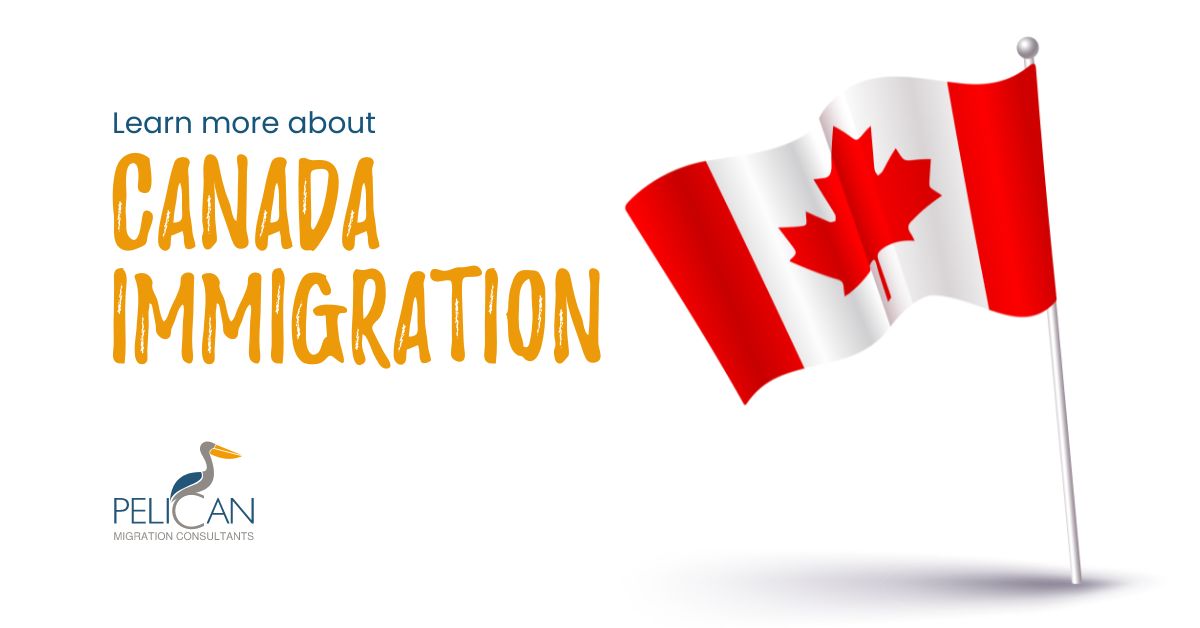
The term "Canada" has its roots in the word "Kanata," which means a community or village. After Russia, Canada has the second-largest area on the entire planet. Canada occupies over two-fifths of the North American continent.
Even with its enormous size, Canada is one of the least inhabited nations in the world. Canada, which welcomes immigrants from all over the world, has established itself as a leading example of a multicultural society. Furthermore, Canada has an abundance of both natural and intellectual resources. Canada has been one of the most popular immigration destinations. Here are the top five ways to immigrate to Canada, whether you wish to do so as a student, a worker, or in another capacity.
One of the best places to live in Canada, which has a strong sense of cosmopolitanism, a good standard of living, and a secure economy. With a high demand for immigrants, Canada has thrown wide its doors to everyone with the potential and abilities to offer it a competitive edge on the world stage.
There are two primary ways for Canadian immigration. Applying for a permanent resident visa is one alternative. Other possibilities are to enter Canada on a temporary work visa, student visa, and investment visa.
What does it mean to be a Permanent Resident of Canada? You have most of the same rights and obligations as Canadian citizens once you are granted a Canada Immigration Visa for permanent residency. As the name implies, you can keep this status permanently if you accrue 2 years of resident days every 5 years. After three years of Canadian residency, you are eligible to petition for Canadian citizenship. Because Canada recognizes dual citizenship, you do not need to surrender your present passport.
Permanent residency and Canadian citizenship differ slightly in terms of how they are applied in real life. You cannot vote in elections if you are a permanent resident, to start. The second is the possibility of deportation as a permanent resident if you commit a serious crime, despite the fact that citizenship is a privilege that cannot be taken away.
Immigration to Canada falls into six primary types. Each category has its own standards and serves a slightly different population of immigrants. Asylum or the Temporary Foreign Worker Program are additional ways to enter Canada.
Federal Skilled Worker
In order to evaluate applicants who are likely to establish themselves economically in Canada after arriving, the skilled worker category has certain qualifications.
Applicant eligibility requirements include:
- possess one of the 38 qualifying vocations for at least a year in the last ten years, working full-time or equivalently;
- possess a valid visa and have been a temporary foreign worker or an international student in Canada for at least one year;
- You can become eligible for arranged employment if a Canadian business offers you a full-time, permanent position.
In addition, a person must have three more qualities in order to qualify for Canadian immigration under the skilled worker category. A required level of work experience is the first. A skilled worker needs to have worked full-time for at least a year (or the equivalent part-time). The National Occupation Classification (NOC) system of Canada stipulates that this employment experience must be skilled and meet either Skill Type 0 or Skill Level A or B requirements. This work experience had to be completed within ten years prior to application.
One of the financial resources is the second component of the skilled worker category. It is simple to meet this condition; applicants just show they have the money to maintain themselves and any dependents for six months after arriving in Canada. This prerequisite is not necessary if your job offer has been authorized.
A point evaluation makes up the third component of the skilled worker category. Citizenship and Immigration Canada (CIC) evaluates a candidate's likelihood of successfully immigrating to Canada using a points-based system. Six separate selection criteria are used to determine how many points are given to each contender. To be eligible for immigration to Canada, a person must receive a score of 67 out of 100. The Canadian Immigration Visa Officers retain the right to approve or deny an application based on a substituted evaluation, thus a passing score on this evaluation does not ensure acceptance.
- The following selected criteria go into the assessment:
- Education (maximum 25 points)
- Language skills (maximum 28 points)
- Work experience (maximum 15 points)
- Age (maximum 12 points)
- Arranged employment (maximum 10 points)
Adaptability (maximum 10 points)
These three components taken together, along with other necessities like security clearances and medical exams, make up the majority of the requirements to enter Canada under the Skilled Worker category. However, you need to meet the requirements of the Province of Quebec, which is listed below, if you're applying to live or work in Montreal or somewhere else in Quebec.
Quebec Skilled Worker
In accordance with a contract between the Province of Quebec and the Government of Canada, Quebec has its own immigration selection procedure for skilled workers. If you plan to settle in Quebec after arriving in Canada, you will be judged according to the Quebec Selection standards rather than the CIC examination. Similar points-based criteria are used in the application procedure for immigration to Quebec, albeit there are a few minor differences.
Quebec evaluates prospective immigrants using a points-based system, similar to the federal system. Single applicants must receive at least 60 points from the 10 selection criteria in order to be eligible for a Quebec Selection Certificate. In contrast, a candidate who has a spouse or common-law partner needs to get at least 68 points.
The following are the selection criteria for skilled worker immigration to Quebec:
- Training (maximum 29 points)
- Validated employment offer (maximum 10 points)
- Experience (maximum 9 points)
- Age (maximum 18 points)
- Language proficiency (maximum 22 points)
- Stay and family in Quebec ( maximum 9 points)
- Spouses characteristics (maximum 18 points)
- Children ( maximum 8 points)
- Financial self-sufficiency (maximum 1 point)
- Adaptability (maximum 8 points)
Provincial Nominee Program
The Provincial Nomination Program is one method for quickening the immigration procedure to Canada (PNP). Choosing those who want to immigrate to Canada and settle in a particular province is done through partnerships between the federal government and provincial governments. There are agreements in place for the majority of Canadian provinces to take part in this program. Provinces are permitted, in accordance with the conditions of these agreements, to nominate candidates for jobs that are in great demand or who will otherwise significantly benefit the province.
An applicant must first submit an application for a Provincial Nomination Certificate to the provincial government of the province in which they wish to live in order to come to Canada under the PNP. Depending on their unique needs, each province has its own set of requirements. Click here to read more about the specifications for each province. An applicant must next submit an application for a Canadian Permanent Resident Visa after acquiring the Provincial Nomination Certificate. Applications for permanent residency are processed more quickly for provincial nominees.
Family Class Sponsorship
Those who are Canadian citizens or permanent residents who are at least 18 years old may sponsor immediate family members who want to immigrate to Canada through the Family Class Sponsorship program. A Canadian citizen or permanent resident must sign a contract committing to support the family member who seeks to immigrate for a period of three to ten years after they arrive in order to sponsor them for Family Class immigration to Canada. The age of the family member being sponsored and the type of relationship determine how long the arrangement will last. The sponsored relative must also sign a contract committing to try their best to become self-sufficient in order to submit an application for immigration under the Family Class.
The following relatives are eligible for sponsorship:
- Common-law partners or spouses.
- Grandparents or parents.
- Dependent children (must be under 22 years of age unless substantially dependent for financial support because they are a full-time student, or because of disability).
- Children under the age of 18 that you intend to adopt or Orphaned younger siblings, nieces, and nephews who are not yet married.
- If you don't have any of the aforementioned family members, a relative of any age.
According to the immigration agreement between the Province of Quebec and the Government of Canada, the Province of Quebec has a role in evaluating whether candidates for sponsorship who are Quebec citizens are eligible. However, this position doesn't start until CIC has finished its preliminary review of the sponsorship application.
Business Immigration
If necessary, a Canadian citizen or permanent resident must show they have the financial resources to support the sponsored relative's basic necessities in order to be qualified to sponsor them. In order to sponsor, the sponsor must often reside physically in Canada. It is possible for Canadian citizens to sponsor their spouse, common-law partner, or children if they can prove their intention to live in Canada by the time the sponsored relative arrives in the country.
Immigrant Investor Program: This program aims to draw seasoned businesspeople who are prepared to contribute significantly to the Canadian economy. Candidates for this program must establish a net worth of at least $800,000 CAD and provide proof that it was acquired legally. Additionally, Immigrant Investors are required to deposit $400,000, which the Canadian government will refund to them without interest after five years. The applicant must have operated a qualifying business, as determined by Canadian immigration officials, in order to be eligible to become an immigrant investor. Québec-bound candidates may be eligible through a comparable Investor Program run by that province.
Entrepreneur Program: The Entrepreneur Program is designed for business immigrants who intend to play an active part in their economic contributions to Canada. The net worth requirements for entrepreneurs are lower (CAD$300,000 as opposed to CAD$800,000) than those for immigrant investors. Within three years of arriving in Canada, applicants for this category of the Business Immigrant Program must commit to managing and owning at least one-third of a Canadian company that will create or sustain employment. Those applying to the province of Quebec may be eligible under a comparable Entrepreneur Program run by that jurisdiction.
Self-Employed: The Self-Employed Persons Program is set up for people who are able and willing to support themselves and their dependents through self-employed income and who have relevant expertise and talents in business, culture, athletics, or farming. Depending on the criteria under which they are applying, a person may need to demonstrate expertise, net worth, or creative qualifications in order to qualify under this program. Those applying for the province of Quebec may be eligible under the Self-Employed Program run by that jurisdiction.
Canadian Experience Class
International students and temporary foreign employees who want to immigrate to Canada permanently can take the Canadian Experience Class. These people have already assimilated into the Canadian society and built significant networks in their towns and professions thanks to their Canadian education and/or work experience.
The criteria for the Canadian Experience Class are graded on a pass/fail basis. For each of the two categories of applicants, there are different minimum requirements:
International graduates with experience working in Canada:
Candidates should possess:
- Completed successfully a course of study lasting at least two academic years at a post-secondary institution in Canada;
- Within 24 months of the application date, had at least one year of skilled, professional, or technical employment experience; and
- Depending on how much language proficiency is required for their job, moderate or basic.
Temporary Foreign Workers:
Candidates should possess:
- Within 36 months of the application date, attained at least two years of skilled, professional, or technical employment experience; and
- Depending on how much language proficiency is required for their job, moderate or basic.
The minimal conditions have been satisfied, and the applicant may apply from within Canada while remaining in possession of a Post-Graduate Work Permit or a Temporary Work Permit. Applications for those who have left Canada must be submitted within a year of their last day of employment there.
Asylum
Canada recognizes its responsibility to grant asylum to anybody suffering persecution, danger, or other injustices in their country of nationality or ordinary home. Canada is a leader in the world and a protector of human rights. Under Canada's refugee system, thousands of such individuals receive protection every year. In Canada, either private sponsorship by individuals or groups, or aid from the government, is an option.
Temporary Foreign Worker Program
The Temporary Foreign Worker Program offers temporary work permits to anyone who wants to move to Canada and work there. These work permits typically call for a legitimate job offer from a Canadian company, though there are some exceptions. Although most work licenses can be extended from within Canada, others have a maximum period of time.
Obtaining a Labor Market Opinion from Human Resources and Social Development Canada, which certifies that the employment won't have a negative impact on Canadian employees, is frequently required for work permits. This rule has a number of exceptions.
The bearer of a Canadian work permit may bring their spouses and common-law partners with them to Canada. The open work visa, which permits the holder to employment with any employer in Canada, is frequently available to spouses.
Would you love to migrate?
The most popular method is probably Express Entry for skilled workers in Canada. Each year, approximately 110,000 immigrants enter the country using the Canada Express Entry program. Consulting with Canada Immigration Consultants is essential because Canadian immigration is a challenging and time-consuming process.
At Pelican Migration Consultants, we want to give you the knowledge you need to make the right decision. We assist you in managing your immigration to Canada so that you can ultimately enjoy a prosperous life in the nation of your choice. We offer one-on-one coaching to make sure your profile is the greatest fit. By assessing our client's chances of obtaining a visa, assisting them in preparing for and receiving feedback from visa interviews, and creating personalized immigration strategic plans for each client, we are able to assist them. Why not try it out with top-notch immigration consultants in Dubai? Check your eligibility before coming to join us! Good luck!


